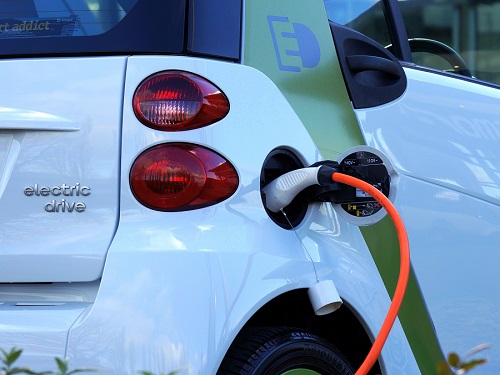Electric Vehicles, Batteries & Renewables

With 7 million electric vehicles already on the world’s roads and with predictions that 31 per cent of the overall car fleet will be electric by 2040 (i.e. 58% of all vehicles sold), how these vehicles are powered by (or can store) renewable energy are the subject of discussion, planning and speculation.
Renewable Energy
Renewable energy is a term to describe energy that is collected from renewable resources, which are naturally replenished on a human timescale. The main sources are sunlight, wind, rain, tides, waves, and geothermal heat. ‘Green’ and ‘renewable’ are words used interchangeably in this arena but have slightly different meanings with nuclear power (for example) hotly contested as being ‘green’ and certainly not renewable (at least in terms of the actual material used).
Battery Technology
Where electric vehicles are concerned, the battery technology is still an area that is a real challenge to how far electric cars are able to travel on a charge.
Implications For Oil and Electricity
Electric vehicles are two or three times more efficient than conventional petrol/diesel-powered vehicles, plus they have the added benefit of having no emissions. However, while there are still limitations on electric car battery technology, more electric cars replacing petrol and diesel cars has implications not just for the oil industry, but also for the demand for electricity. For example, demand for oil is predicted by BNEF to reduce by 17.6 million barrels per day (bpd) by 2040 as anti-pollution legislation and the resulting increase in electric-powered transport takes over. BNEF also says that the increased number of electric cars could mean a 5.2% increase in the demand for power as well as the need for 290 million charging points by 2040.
Battery Innovation
According to recent reports, however, Chinese car battery-maker Contemporary Amperex Technology has developed (and is about to manufacture) a battery that can power an electric vehicle for an incredible 1.2 million miles over a 16-year lifespan. Reports indicate that deals may already be in place for the Chinese battery-maker to supply Tesla, BMW, Daimler, Honda, Toyota, Volkswagen, and Volvo for the next two years.
Dyson & Electric Car Batteries
Back in October last year Dyson has scrapped its £2.5 billion ‘N526’ electric car project but announced that work would continue improving the battery technology that would have been used in the car. Dyson had originally planned to invest £1 billion in development of the car and invest another £1 billion in developing the electric battery technology.
Electric Vehicles Using Renewable Energy
Pilot Schemes are being run, mainly in the U.S., that provide ways for electric vehicle owners to use renewable energy for their vehicles, and to charge at times that help integrate more renewable energy sources on the grid. These schemes include:
– For a small monthly subscription, Austin Energy’s Plug-in EVerywhere Network gives electric car drivers access to a network of charging stations where the electricity is sourced from the wind. Also, fast charging network company EVgo operated a scheme that gave customers access to power sourced 100% from wind or solar energy. Customers could choose to pay-as-you-go or via monthly payments to access this renewable energy power for their electric vehicles.
– Pacific Gas & Electric’s ‘Charge Forward’ managed charging program let customers control the timing of their EV charging to align with clean energy availability and grid needs (in exchange for low charging rates).
– Gas & Electric, in partnership with the City of San Diego, gave electric car customers access to charging stations that were powered by photovoltaic (PV) canopies installed right next to the charging stations. The solar energy was stored in a battery system.
– In January last year, Southern California Edison introduced a discount scheme for customers who charged their electric vehicles on weekdays and during off-peak hours on weekends, when solar was abundant.
Battery Hubs
Although there are currently fewer than 200,000 electric vehicles on UK roads, National Grid, the UK’s energy system operator proposed the creation of a battery hub that a fleet of 35m electric vehicles could feed renewable energy into, thereby helping the UK to reach its net-zero carbon target.
The idea was based upon the prediction that electric vehicles will become the most popular form of transport between 2030 and the early 2040s in the UK and by 2050, tens of millions of electric cars will be using (renewable) wind and solar power to charge up within minutes in a way that can create renewable energy battery packs for when the UK’s grid needs more energy.
It is thought that such a system could use algorithms to help the smart electric cars to balance demand and supply on the grid and make the most of renewable energy as well as saving customers money.
Looking Ahead
With so many electric vehicle purchases predicted in the near future, making serious advances in battery technology, and finding ways to charge electric vehicles using renewable energy sources to make the most of the green benefits are becoming major concerns. It also seems that there will ways in which electric vehicles and the grid can interact to help manage demand and utility companies will be finding ways to help customers to choose renewable energy for their charging needs, and will be able to offer price incentives to customers who are willing to charge their vehicles at times that will benefit the grid.
Boris Johnson is said to be currently considering a scheme to give drivers up to £6,000 to tempt them to change their old petrol/diesel cars for new electric ones, as part of a suite of plans to be announced shortly, in an attempt to kick-start the economy’s flagging vehicle sales, which has been hugely impacted by Covid-19.
Sponsored
Ready to find out more?
Drop us a line today for a free quote!
